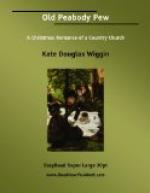On the seventeenth of December, Justin, his business day over, was walking toward the dreary house in which he ate and slept. As he turned the corner, he heard one woman say to another, as they watched a man stumbling sorrowfully down the street: “Going home will be the worst of all for him—to find nobody there!” That was what going home had meant for him these ten years, but he afterward felt it strange that this thought should have struck him so forcibly on that particular day. Entering the boarding-house, he found Mrs. Burbank’s letter with its Edgewood postmark on the hall table, and took it up to his room. He kindled a little fire in the air-tight stove, watching the flame creep from shavings to kindlings, from kindlings to small pine, and from small pine to the round, hardwood sticks; then when the result seemed certain, he closed the stove door and sat down to read the letter. Whereupon all manner of strange things happened in his head and heart and flesh and spirit as he sat there alone, his hands in his pockets, his feet braced against the legs of the stove.
It was a cold winter night, and the snow and sleet beat against the windows. He looked about the ugly room: at the washstand with its square of oilcloth in front and its detestable bowl and pitcher; at the rigours of his white iron bedstead, with the valley in the middle of the lumpy mattress and the darns in the rumpled pillowcases; at the dull photographs of the landlady’s hideous husband and children enshrined on the mantelshelf; looked at the abomination of desolation surrounding him until his soul sickened and cried out like a child’s for something more like home. It was as if a spring thaw had melted his ice-bound heart, and on the crest of a wave it was drifting out into the milder waters of some unknown sea. He could have laid his head in the kind lap of a woman and cried: “Comfort me! Give me companionship or I die!”
The wind howled in the chimney and rattled the loose window-sashes; the snow, freezing as it fell, dashed against the glass with hard, cutting little blows; at least, that is the way in which the wind and snow flattered themselves they were making existence disagreeable to Justin Peabody when he read the letter; but never were elements more mistaken.
It was a June Sunday in the boarding-house bedroom; and for that matter it was not the boarding-house bedroom at all: it was the old Orthodox church on Tory Hill in Edgewood.
The windows were wide open, and the smell of the purple clover and the humming of the bees were drifting into the sweet, wide spaces within. Justin was sitting in the end of the Peabody pew, and Nancy Wentworth was beside him; Nancy, cool and restful in her white dress; dark-haired Nancy under the shadow of her shirred muslin hat.
Rise, my soul, and stretch thy wings,
Thy better portion trace.




